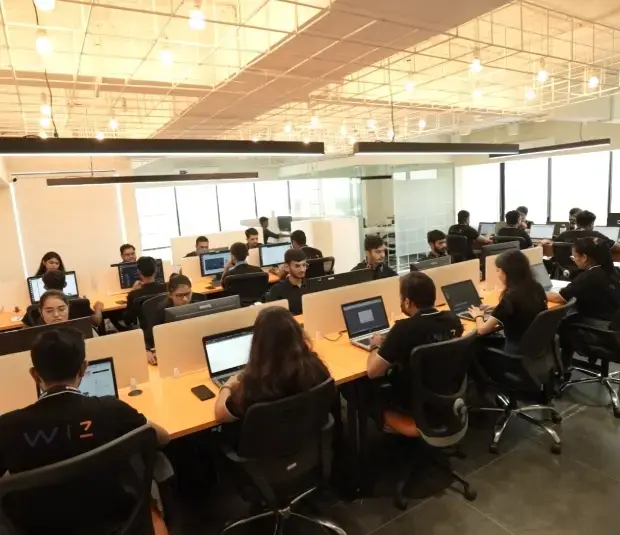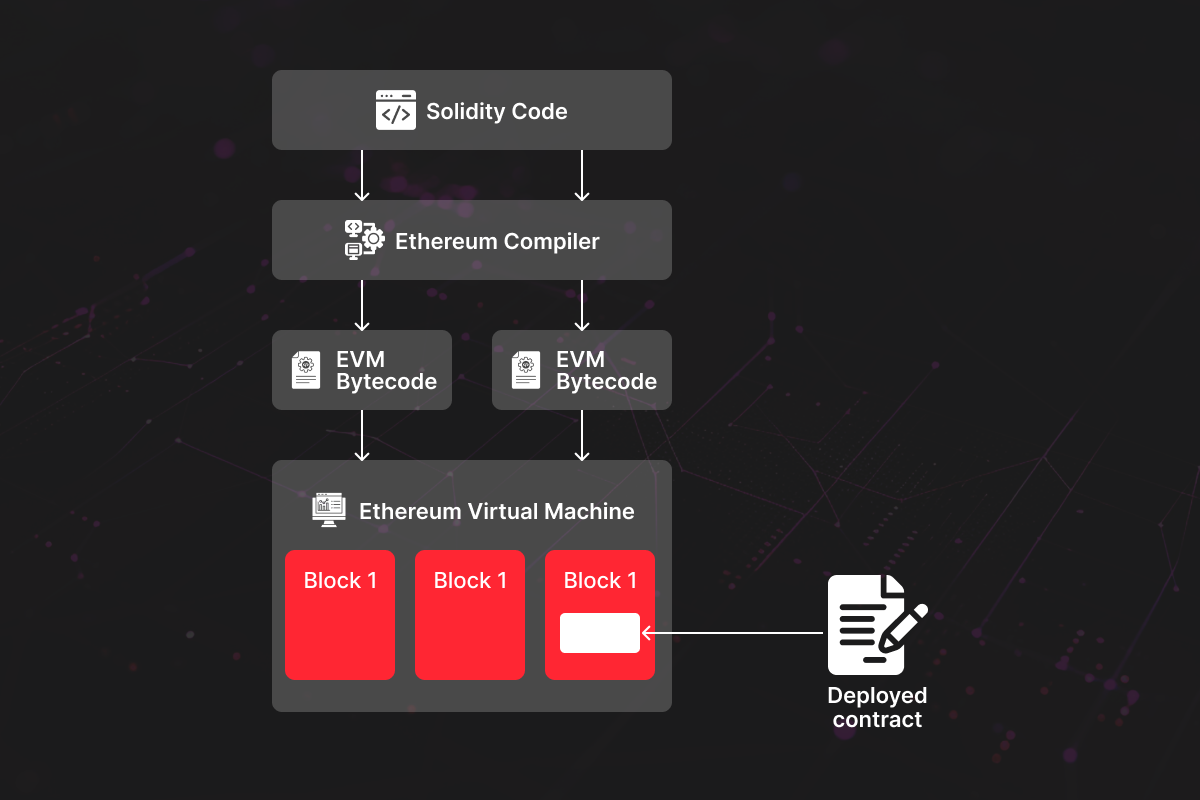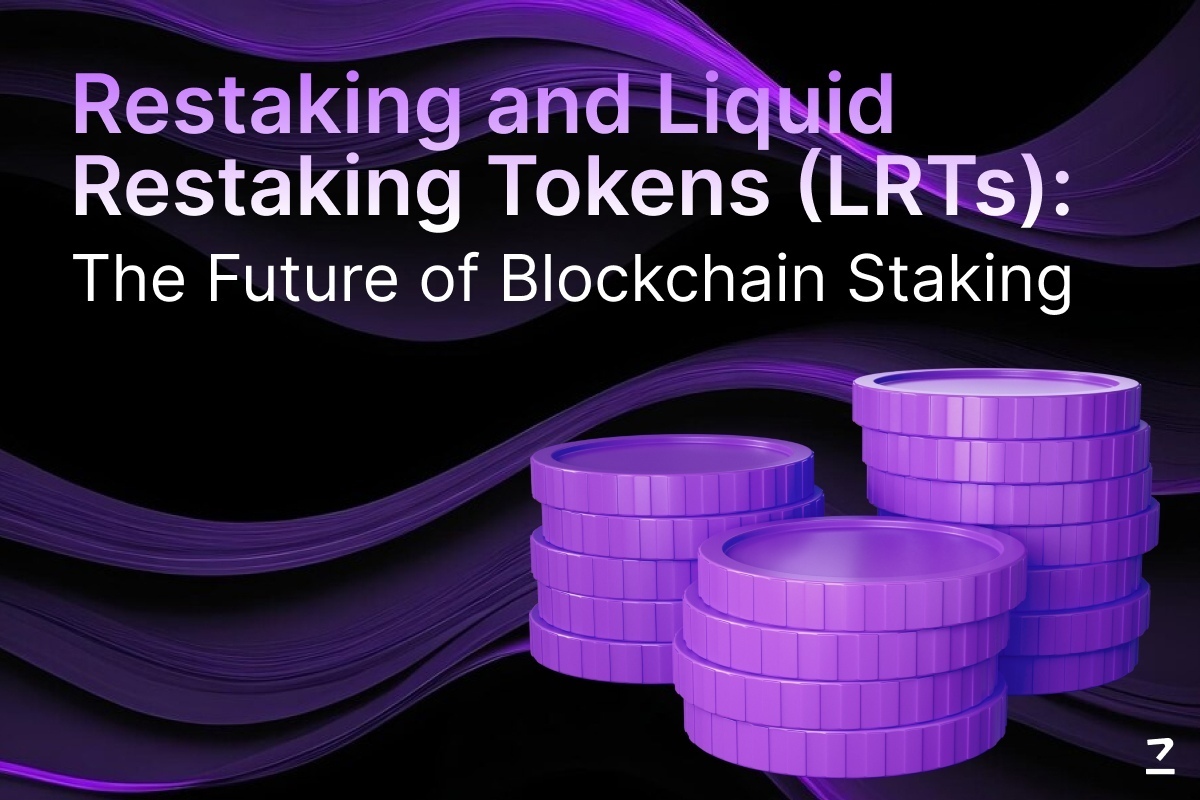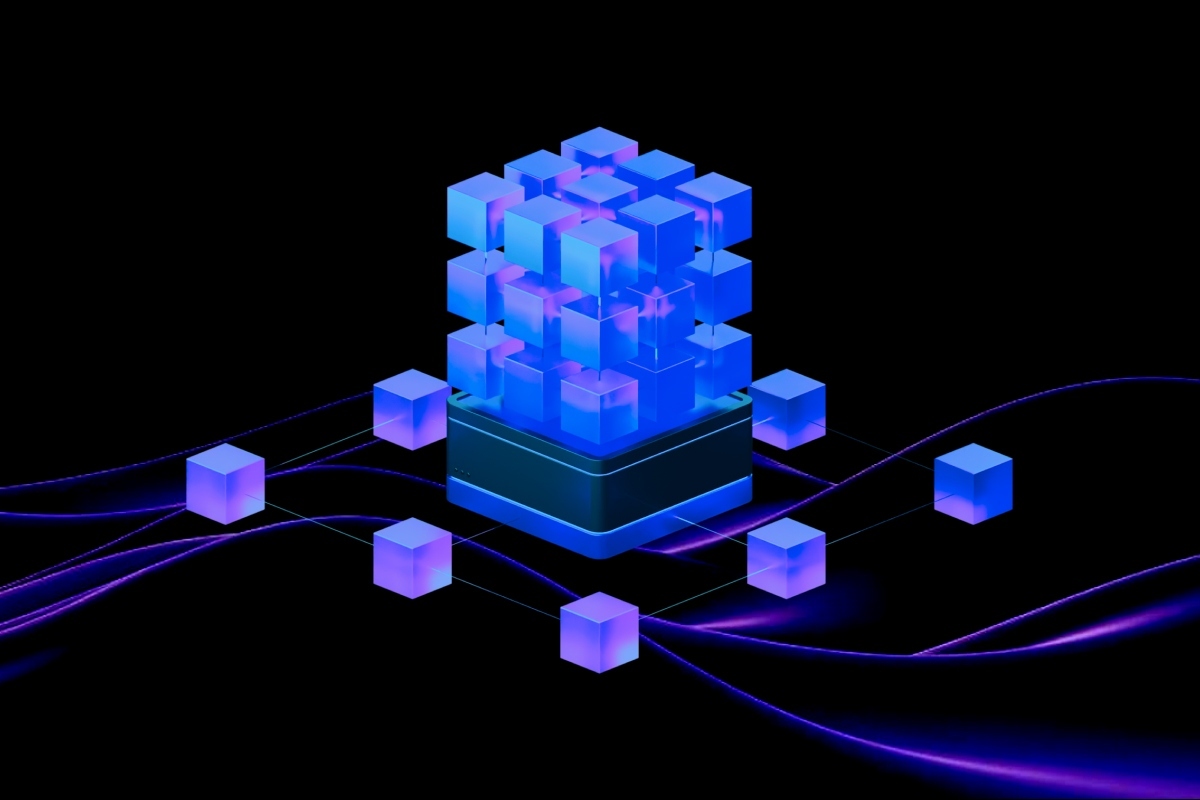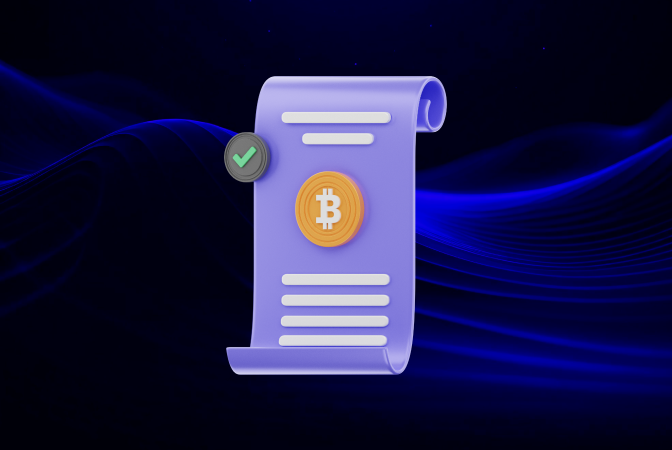SHARE THIS ARTICLE
Solidity vs Rust vs Go: The Best Programming Language for Blockchain Development
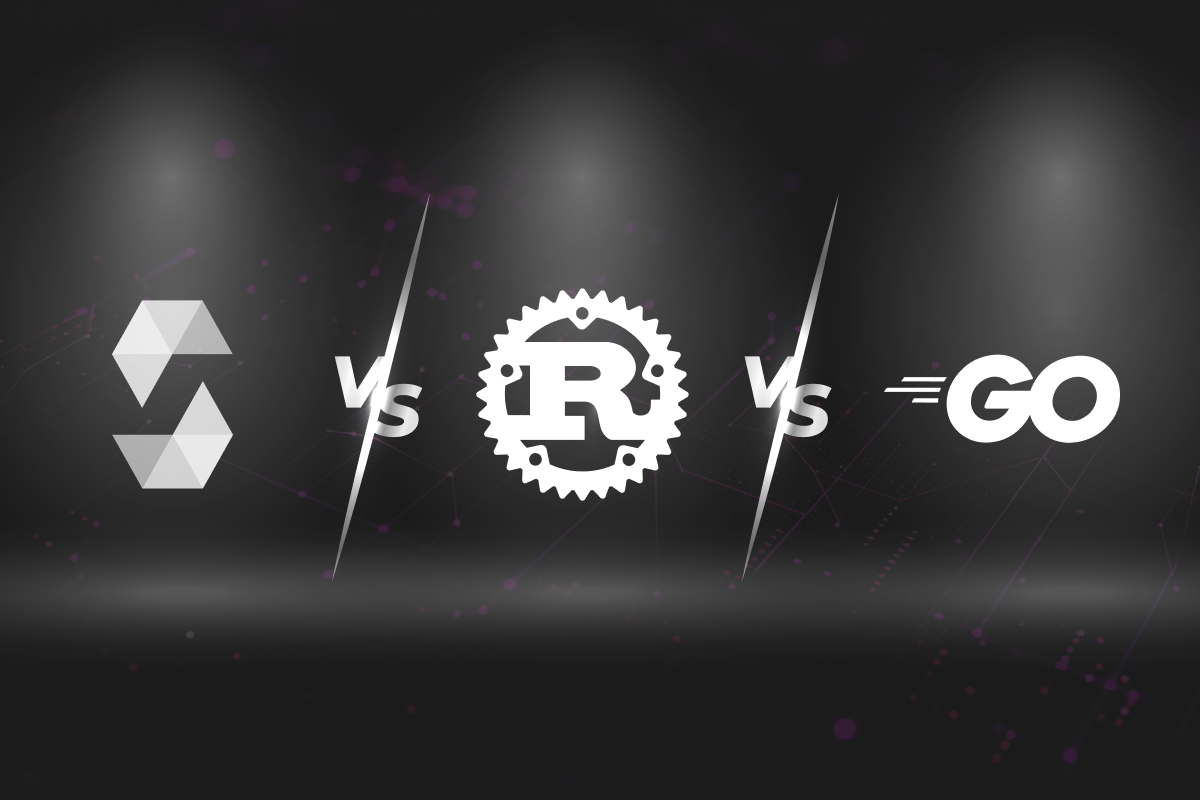
Programming languages play a crucial role in the development and implementation of blockchain technology. As the blockchain ecosystem advances, certain programming languages have become prominent choices for blockchain developers. Among these, Solidity, Rust, and Go have gained significant traction and recognition for their unique capabilities and suitability for various blockchain use cases.
Solidity, designed specifically for Ethereum's smart contract development, has become the de facto standard for building decentralized applications (dApps) on the Ethereum network. Rust, known for its focus on performance, safety, and concurrency, has also gained popularity in the blockchain space, particularly for developing high-performance blockchain platforms and secure smart contracts. Go, a statically typed, compiled language, has found its niche in building efficient blockchain node implementations and cross-chain communication solutions.
The choice of programming language for a blockchain project can significantly impact the project's performance, security, and overall development experience. Understanding the strengths, weaknesses, and use cases of Solidity, Rust, and Go is essential for businesses and developers looking to leverage the power of blockchain technology effectively. In this comprehensive article, we will provide a thorough comparison and guide readers in selecting the best language for their blockchain development needs.
Understanding the Contenders
Solidity, Rust, and Go are three distinct programming languages that have made significant contributions to the blockchain ecosystem. Each language brings unique strengths and use cases to the table, making them suitable for various blockchain development projects.
Solidity was created in 2014 specifically for the Ethereum Virtual Machine (EVM). Its syntax draws inspiration from Javascript, making it familiar for web developers. Beyond blockchain, Solidity finds applications in building secure Decentralized Applications (DApps).
Rust was developed by Mozilla Research in 2010. It is well-known for memory safety and performance. Its unique ownership system prevents memory-related errors, a critical aspect for secure applications. Rust's general-purpose nature extends its use cases beyond blockchain, finding applications in operating systems, embedded systems, and high-performance web applications.
Go, launched by Google in 2009, is renowned for its simplicity, readability, and powerful concurrency features. These attributes make it a popular choice for building large-scale, distributed systems. While not directly used for writing smart contracts, Go plays a vital role in blockchain development. It's instrumental in creating the back-end infrastructure and developer tools that power blockchain ecosystems.
Solidity - The Ethereum Standard
Solidity lies at the heart of Ethereum's smart contract ecosystem. Developed by Gavin Wood, one of Ethereum's co-founders, Solidity was designed to be a high-level, contract-oriented, and statically typed language that compiles directly to the Ethereum Virtual Machine (EVM) bytecode.
Technical Details
Solidity's syntax is heavily inspired by JavaScript, making it familiar and approachable for developers with prior experience in web development. This similarity in syntax allows for a smoother learning curve when you hire Solidiy developers, as the language’s object-oriented features, such as inheritance and libraries, build upon concepts that are already familiar to many programmers.
Solidity's primary purpose is to facilitate the creation of smart contracts, self-executing pieces of code that run on the Ethereum blockchain. These smart contracts can handle a wide range of functionalities, from simple token transfers to complex decentralized finance (DeFi) applications. Solidity's features, such as event logging, error handling, and the ability to interact with other contracts, provide developers with the necessary tools to build efficient and feature-rich smart contracts.
One of the key considerations when working with Solidity is security. Due to the immutable nature of the blockchain and the potential for high-value transactions, Solidity code must be carefully audited to identify and eliminate vulnerabilities, such as reentrancy attacks. The Solidity documentation provides extensive guidance on security best practices, and the community has developed various tools and frameworks to assist developers in writing secure smart contracts.
Benefits of Using Solidity
Solidity's widespread adoption and the maturity of the Ethereum ecosystem are significant advantages for developers. The language benefits from a large and active developer community, providing a wealth of learning resources, libraries, and tooling support. This ecosystem includes popular frameworks like Truffle and Hardhat, which optimize the development, testing, and deployment of Solidity-based applications.
Furthermore, Solidity's tight integration with the EVM allows for smooth interoperability with other EVM-compatible blockchains, such as Binance Smart Chain and Polygon. This cross-chain compatibility expands the potential reach and adoption of Solidity-based dApps, allowing developers to utilize the strengths of multiple blockchain networks.
Drawbacks to Consider
While Solidity’s close relationship with the EVM provides many benefits, it also introduces some limitations. Developers have limited control over the underlying infrastructure, as the EVM dictates the execution environment and gas costs for various operations. This can lead to performance constraints; as certain computations may be considerably more expensive on the EVM compared to traditional computing environments.
Furthermore, the reliance on the EVM can introduce challenges in terms of execution speed and scalability, as the EVM is designed to be a secure and decentralized runtime environment, rather than a high-performance computing platform. As the demand for blockchain-based applications continues to grow, these limitations may become more pronounced, driving the need for alternative programming languages and execution environments.
Rust – The Performance Powerhouse
Rust, the systems programming language developed by the Rust Foundation, has gained substantial attention in the blockchain development community for its exceptional performance and security characteristics. Rust's reputation for memory safety, concurrency, and efficient resource management has made it an increasingly attractive choice for building high-performance blockchain platforms and secure smart contract applications.
Technical Deep Dive
The most prominent of Rust’s capabilities include its unique ownership system, which effectively prevents common memory-related issues, such as memory leaks and dangling pointers. This ownership model, combined with Rust's strong type system and compile-time checks, makes sure that the code is free from these types of memory-related vulnerabilities, making it an ideal choice for building mission-critical blockchain infrastructure.
Rust's compilation to native code rather than relying on a virtual machine like the Ethereum Virtual Machine (EVM), also contributes to its exceptional performance. By generating highly optimized machine code, Rust-based blockchain applications can achieve notable speed and efficiency gains, particularly in scenarios where computational resources are limited or performance is a critical requirement.
Rust's integration with prominent blockchain platforms, such as Solana and Polkadot, further demonstrates its growing adoption in the blockchain ecosystem. These platforms utilize Rust's strengths to build high-throughput, scalable, and secure blockchain networks, showcasing the language's suitability for complex blockchain development tasks.
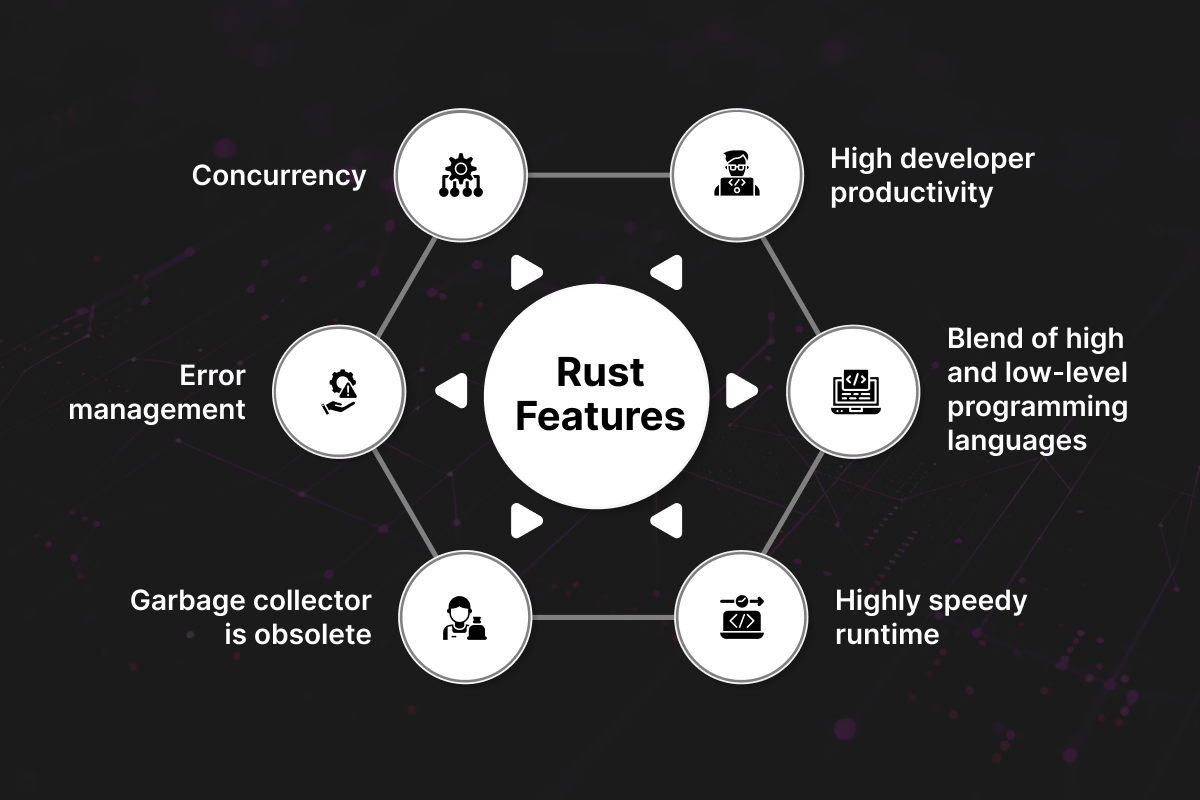
Benefits of Using Rust
Hire Rust developers when you’re looking for unparalleled security and performance. Rust is a compelling choice for developing sophisticated blockchain applications. Its focus on memory safety and concurrency control makes sure that the resulting code is efficient and resilient, reducing the risk of critical vulnerabilities that can plague blockchain systems.
With the ongoing development of the blockchain industry, Rust's future-proof approach to memory management and its growing popularity in the development community position it as a language that can keep pace with the increasing demands of the blockchain ecosystem. Developers who invest in learning Rust can future-proof their skills and contribute to the development of advanced blockchain technologies.
Drawbacks of Rust
The primary drawback of Rust programming language is the steeper learning curve it presents when compared to Solidity. As a result, developers who are new to the language may require additional training and onboarding. Moreover, the Rust ecosystem, while rapidly growing, may not yet offer the same level of maturity and breadth of tooling and libraries as the Solidity ecosystem, which has benefited from Ethereum's widespread adoption.
These drawbacks, however, are often outweighed by Rust's significant advantages in terms of security, performance, and future-proofing, making it a favorable choice for blockchain developers who are willing to invest the time and effort to master the language.
Go – Building Scalable Blockchains
Go, the statically typed, compiled programming language developed by Google, has come up as a preferred choice for building scalable and efficient blockchain applications. While not specifically designed for blockchain development, Go's inherent strengths in building large-scale distributed systems make it a versatile and attractive option for blockchain engineers.
Go's Blockchain Capabilities
Go's concurrency features, centered around goroutines and channels, are particularly well-suited for handling the demands of blockchain workloads. Goroutines, Go's lightweight threads of execution, allow developers to easily create and manage multiple concurrent tasks, such as processing transactions, validating blocks, and communicating with the network. Channels, on the other hand, provide an efficient mechanism for coordinating and synchronizing these concurrent processes, facilitating efficient and reliable blockchain operations.
Go's built-in networking support, including low-level primitives for TCP/UDP communication, further improves its suitability for blockchain development. Blockchain networks inherently rely on effective and secure communication protocols. So hire Golang developers when strong networking capabilities that simplify the implementation of these critical components are essential. This allows developers to focus on the core blockchain logic.
The blockchain community has also embraced Go, with several prominent blockchain frameworks and platforms utilizing the language's strengths. Hyperledger Fabric, a popular enterprise-grade blockchain platform, is written primarily in Go, showcasing the language's ability to handle the complexities of building scalable and enterprise-ready blockchain solutions.
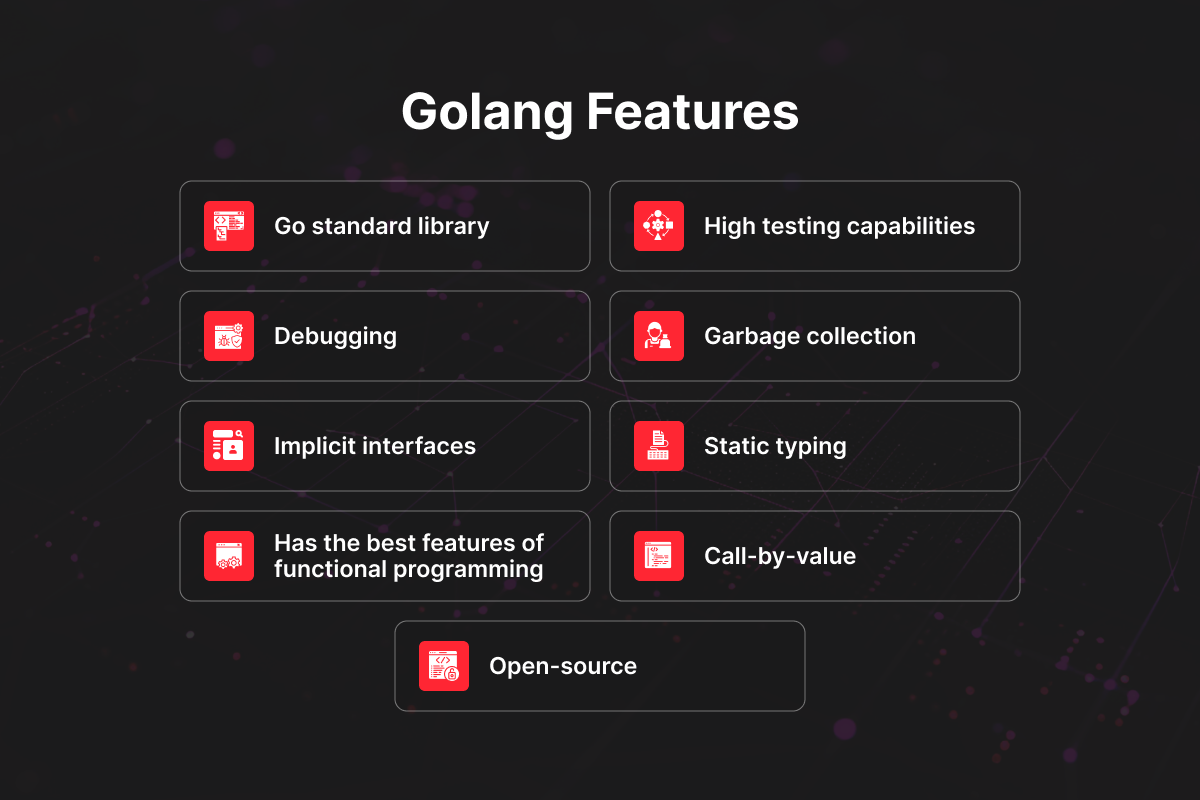
Benefits of Go for Blockchain
Go's simplicity and familiarity make it an attractive choice for developers, especially those with prior experience in other C-style languages. The language's readable syntax and straightforward approach to concurrency and networking help to reduce the learning curve, allowing developers to quickly become productive in the blockchain domain.
The efficiency and performance characteristics of Go are also well-suited for blockchain applications, which often require high-throughput processing and low-latency responses. Go's ability to generate standalone, statically linked binaries further simplifies the deployment and distribution of blockchain nodes and services, a crucial aspect of building scalable and resilient blockchain networks.
Limitations of Using Go for Blockchain
Go's general-purpose nature and distributed systems expertise make it a strong contender for blockchain development. However, the language is not specifically designed for smart contract programming. Developers may need to rely on additional libraries or frameworks, such as Ethereum's Go-Ethereum (Geth) client, to handle the specific requirements of smart contract development and deployment.
Additionally, as with any language, security considerations are crucial when building blockchain applications. Go's simplicity and focus on concurrency do not inherently guarantee secure code, and developers must still exercise caution and follow best practices to offer the robustness and resilience of their blockchain solutions.
Making the Right Choice
Selecting the most suitable language for your blockchain project depends on a clear understanding of your specific needs. The following table summarizes the key features, strengths, and weaknesses of each language to aid your decision.
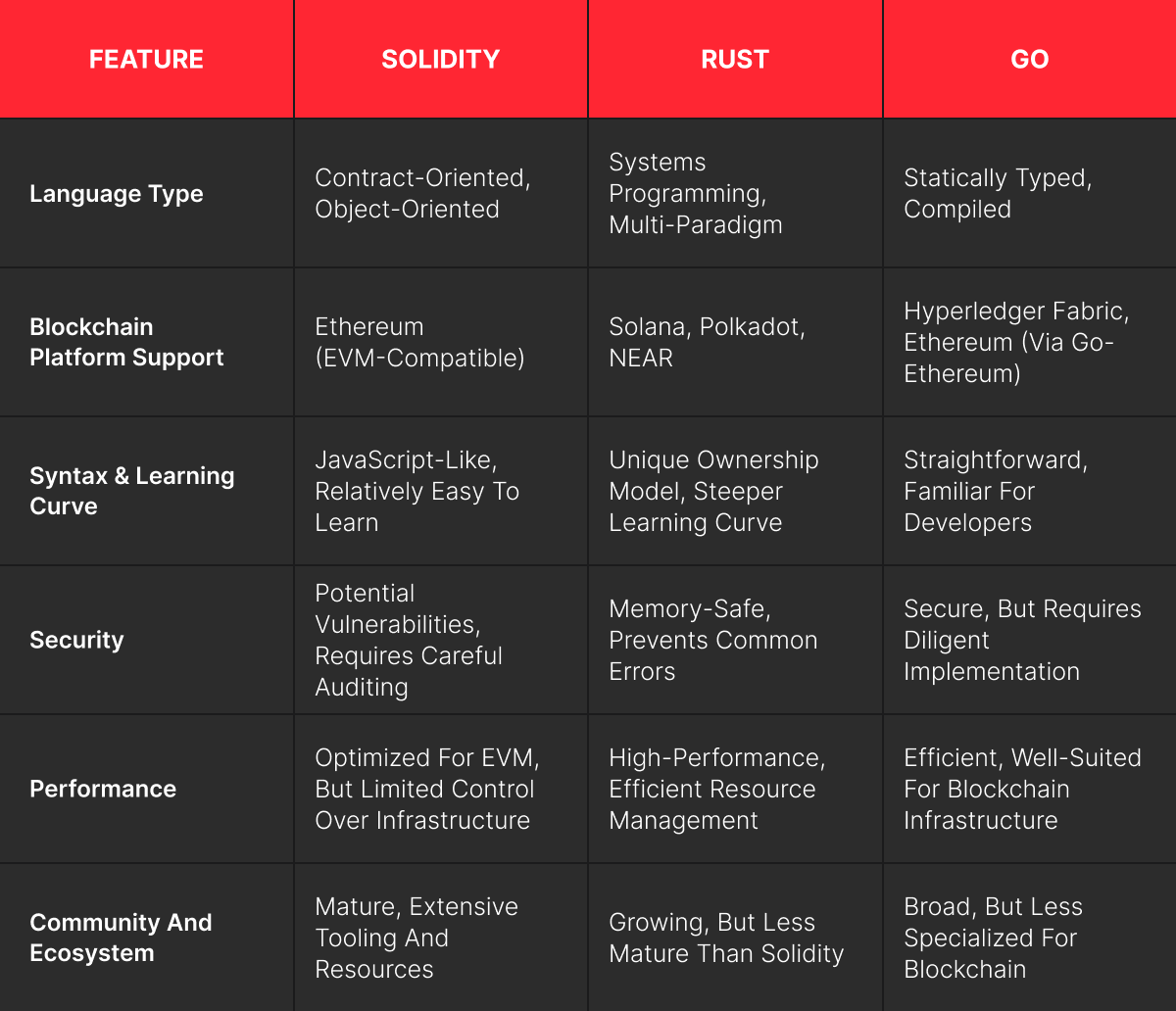
When choosing the right programming language for your blockchain project, consider the following key factors.
Project Type
-
Smart Contracts: If your project primarily involves developing decentralized applications (dApps) and smart contracts, Solidity's tight integration with the Ethereum ecosystem and its ease of use make it a strong choice.
-
Blockchain Infrastructure: For building high-performance, scalable blockchain platforms and nodes, Rust's focus on security and efficiency, or Go's versatility in distributed systems, may be more suitable.
Security Requirements
-
Memory Safety: If your project demands the highest levels of security and reliability, Rust's memory-safe design and prevention of common programming errors should be a top consideration.
-
Auditing and Vulnerability Mitigation: For projects where security is critical but the development team is more familiar with Solidity, the language's extensive documentation and tooling for security best practices can help reduce risks.
Developer Expertise and Team Skills
-
Existing Skillsets: If your team already has experience with JavaScript or C-style languages, Solidity or Go may be easier to onboard and integrate into the development process.
-
Learning Curve: For teams willing to invest in mastering a new language, Rust's powerful features and growing blockchain adoption can provide long-term benefits, despite its steeper learning curve.
Blockchain Platform Compatibility
-
EVM-compatible Blockchains: Solidity's tight integration with the Ethereum Virtual Machine (EVM) makes it the natural choice for building applications on Ethereum and other EVM-compatible networks.
-
Alternative Blockchain Platforms: Rust's increasing adoption in Solana, Polkadot, and other non-EVM blockchains opens up opportunities for cross-chain development and interoperability.
Community and Ecosystem Maturity
-
Tooling and Resources: Solidity benefits from a well-established ecosystem with extensive libraries, frameworks, and development tools, making it easier to get started and find support.
-
Future Outlook: While Rust and Go may have less mature blockchain-specific tooling, their growing communities and versatility across various domains suggest promising long-term prospects.
By carefully considering these factors and aligning them with your project's specific requirements, you can make an informed decision on the best programming language for your blockchain project.
Real-World Applications and Case Studies
The blockchain industry has seen a wide range of real-world applications and use cases that tap into the unique strengths of Solidity, Rust, and Go.
Solidity in Action
Solidity's tight integration with the Ethereum ecosystem has made it the go-to language for building decentralized finance (DeFi) applications and non-fungible token (NFT) projects on the Ethereum blockchain. Projects like Uniswap, a leading decentralized exchange, and OpenSea, the largest NFT marketplace, have been developed using Solidity, showcasing its capabilities in handling complex financial transactions and digital asset management.
Furthermore, many Ethereum-based dApps, such as decentralized gaming platforms, supply chain management solutions, and identity management systems, have been built using Solidity. The language's object-oriented features and event-driven architecture have proven to be well-suited for these types of applications, where the ability to interact with smart contracts and handle state changes is crucial.
Rust's Blockchain Prowess
-
High-performance Blockchain Platforms: Solana, a high-throughput blockchain platform, utilizes Rust to achieve blazing-fast transaction speeds and low latency. This combination opens up possibilities for real-time applications and DeFi protocols requiring rapid settlements.
-
Secure Smart Contract Development: Polkadot, a blockchain protocol facilitating communication between different blockchains, utilizes Rust for its smart contract development. Rust's focus on memory safety ensures secure and reliable interactions across the Polkadot ecosystem.
-
Cross-chain Interoperability: Projects like Cosmos, aiming to connect various blockchains, utilize Rust to build bridges and facilitate effective communication of data and assets between disparate blockchain networks.
Go's Blockchain Versatility
-
Blockchain Node Implementations: Hyperledger Fabric, a popular enterprise blockchain framework, utilizes Go for its node implementations. Go's efficiency and scalability make it well-suited for building the infrastructure that underpins permissioned blockchain networks.
-
Cross-chain Communication: Projects like Chainlink, a decentralized oracle network, utilize Go to create communication protocols that bridge the gap between blockchains and external data sources. This functionality is crucial for smart contracts to access real-world data and trigger actions based on off-chain events.
-
Enterprise-grade Blockchain Solutions: Many companies are adopting blockchain technology for internal operations and supply chain management. Go's suitability for building secure and scalable backends makes it a valuable tool for developing enterprise-grade blockchain solutions.
The Future of Blockchain Development
Blockchain development is dynamic and the programming language space reflects this fluidity. While Solidity, Rust, and Go are the prominent players, there are other languages and technologies that are gaining traction and may play a vital role in the future of blockchain development.
Up-and-Coming Languages
-
Vyper: This language, created by the Ethereum Foundation, prioritizes security by incorporating static typing and formal verification methods. While still under development, Vyper has the potential to address some of Solidity's security vulnerabilities.
-
Move (Sui): Developed by Meta (formerly Facebook), Move is a new language designed specifically for secure and scalable smart contract development. Its focus on safety features and resource management positions it as a potential contender in the future.
Trends to Watch
Domain-Specific Languages (DSLs): These specialized languages cater to specific use cases within blockchain development. For example, DSLs for building secure and efficient DeFi protocols might come up, optimizing development for niche applications.
The dynamic nature of blockchain development necessitates staying informed about the latest language advancements and tooling. Hire blockchain developers with Codezeros. We possess a team of highly skilled blockchain developers who are well-versed in Solidity, Rust, and Go. We are also constantly evaluating emerging languages and trends so that we can provide our clients with the most cutting-edge solutions.
Whether you're building a DeFi protocol, a secure smart contract, or a scalable blockchain backend, we have the expertise to guide you. Contact us today to discuss your project requirements.
Post Author
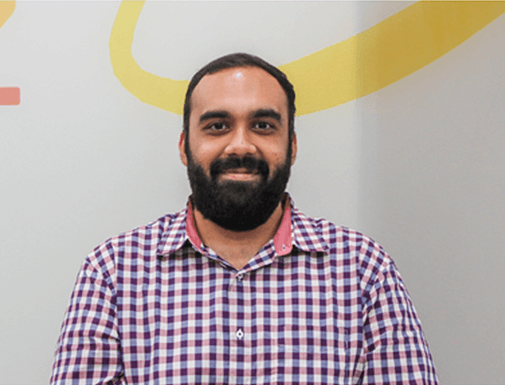
As a distinguished blockchain expert at Codezeros, Paritosh contributes to the company's growth by leveraging his expertise in the field. His forward-thinking mindset and deep industry knowledge position Codezeros at the forefront of blockchain advancements.
Collaborate with Codezeros for your next enterprise blockchain project
Level up your next enterprise blockchain project with Codezeros. Our team of blockchain experts combines cutting-edge languages (Solidity, Rust, Go) with deep industry knowledge to deliver secure, scalable solutions.
